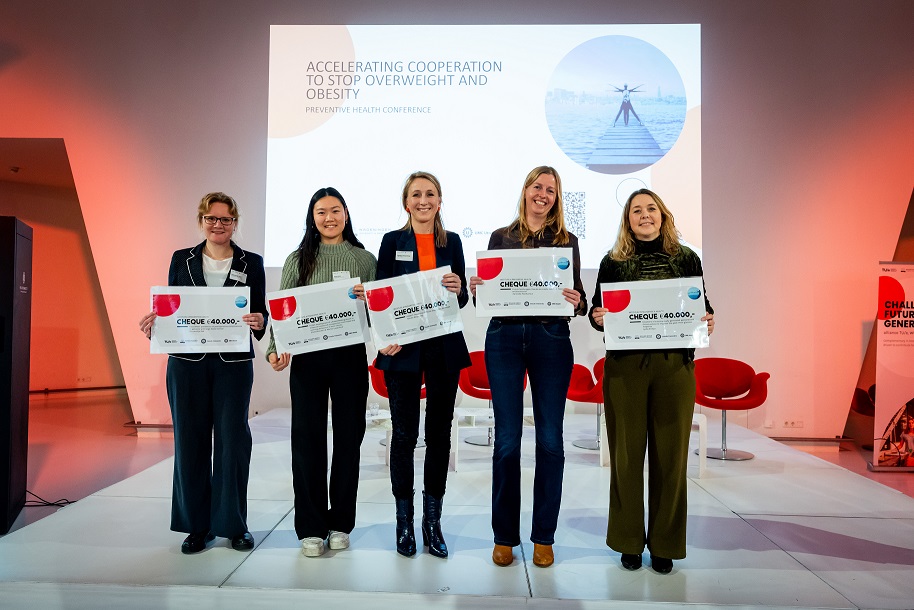Five research projects and 28 researchers of the alliance between Eindhoven University of Technology, Wageningen University & Research, Utrecht University and Utrecht University Medical Center (EWUU) will receive 200 thousand euros to accelerate research and cooperation in the field of preventive health. The research is aimed at preventing disease and optimizing quality of life. The collaboration between the four different institutions will bring together the knowledge of different research areas to provide effective preventive measures.

TU/e, WUR, UU and UMC Utrecht work together in the field of preventive health. To further strengthen this collaboration, the Institute for Preventive health (I4PH) has been established and a seed fund has been set up. The five research projects receiving seed money today have assembled teams of researchers from the four institutions. For example, industrial designers collaborate with dieticians and data specialists collaborate with behavioral experts.
Martine van der Mast, Programme Director i4PH: “Due to the increasing number of elderly people and people with chronic and lifestyle-related diseases, the pressure on healthcare (costs) is increasing. A stronger focus on prevention is crucial to continue providing quality care. By funding these projects, we are providing a stepping stone to larger research on effective preventive measures.”
The five research projects that received seed money are:
Future foodscapes: how do we create healthier food environments?
The research focuses on the relationship between different ways in which “foodscapes” (exactly where which type of retail outlet is located) in neighborhoods are designed and the expected eating behavior and health of residents. Using digital twins (3D copies) of neighborhoods, researchers test scenarios for a healthier food supply and propose targeted interventions in the neighborhood. Researchers: Theo Arentze (TUe), Pauline van den Berg (TUe). Harm Veling (WUR), Maartje Poelman (WUR), Hanneke Posthumus (UU), Roland Geraerts (UU), Tabea Sonnenschein (UU & UMC Utrecht), Yvonne Vendrig (UMC Utrecht)
Creations of automatically generated personalized dietary advice to improve the post-meal glucose response
Nutrition advice based on a personalized approach enables people to play an active role in their own health and take responsibility for it. In this project, the researchers are developing digital twins (3D copies) of people. Using sensors, real-time measurements are taken, for example of glucose, in order to provide personalized nutritional advice. Researchers: Natal van Riel (TUe), Lydia Afman (WUR), Hanna Hauptmann (UU)
Fiber2Heal: prevention of postoperative complications in patients with large bowel cancer
A higher intake of dietary fiber before surgery in patients with colon cancer is associated with a lower risk of complications after this surgery. Using the digital Fiber-UP tool, the research team is developing personalized dietary advice for appropriate fiber intake in colon cancer patients. Researchers: Pieter Van Gorp (TU/e), Jaap Ham (TU/e), Panos Markopoulos (TU/e), Dieuwertje Kok (WUR), Nicole de Wit (WUR), Ben Witteman (WUR), Annemieke Kok (UMC Utrecht), Flip Kruyt (Gelderse Vallei hospital)
FLOW! Development of a breastfeeding device to measure breastmilk composition and intake and suckling behavior of term infants
To ensure optimal growth and development of a baby and to prevent parents from prematurely stopping breastfeeding, the team wants to use a prototype to be developed to gain more insight into the volumes of breast milk that babies ingest. The research focuses on the influence of quality and quantity of breast milk on health, as specific knowledge about this is still lacking. Researchers: Yuan Lu (TUe), Elske Brouwer-Brolsma (WUR), Marlou Lasschuijt (WUR), Dr. P. Jeurink (UU), Indre Kalinauskaite (UMC Utrecht)
PROACT: PRevention Of ACute EvenTs of Older People
Preventing unplanned hospitalizations requires in-depth knowledge of patient-related, environmental and care-related factors. Using various digital tools, the research team tests and measures how older people can remain self-reliant for longer and what interventions are needed to prevent admission to the ED. Researchers: Helianthe Kort (TU/e), Laura Genga (TU/e), Bella Struminskaya (UU), Nienke Bleijenberg (UMC Utrecht)
The research teams share the findings from their research so that all stakeholders in the transition to a healthier society can use the knowledge.